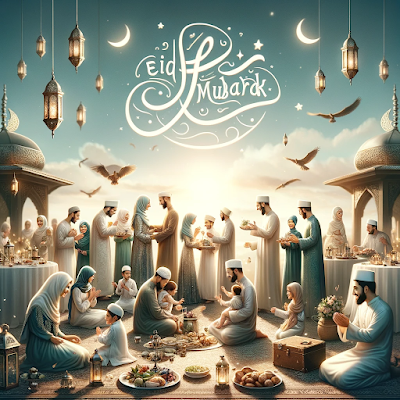Celebrating Eid-ul-Fitr: A Festival of Joy and Renewal
Eid-ul-Fitr, known as the Festival of Breaking the Fast, is a time of joy, celebration, and reflection for Muslims around the world. Marking the end of Ramadan, the Islamic holy month of fasting, Eid-ul-Fitr is not just a festive day but a profound cultural and religious event. This article delves into the rich traditions, cultural diversity, and deep spiritual significance of Eid-ul-Fitr, offering insights into one of the most important celebrations in the Islamic calendar.
Understanding Eid-ul-Fitr: The Festival of Breaking the Fast
Eid-ul-Fitr is celebrated on the first day of Shawwal, the month following Ramadan. This festival is characterized by communal prayers, feasts, charity, and family gatherings. It is a time when Muslims express gratitude to Allah for the strength to complete the fast and reflect on the lessons learned during Ramadan.
The Significance of Eid-ul-Fitr in Islamic Culture
Eid-ul-Fitr is not only a celebration but also a symbol of unity, gratitude, and renewal for Muslims. It embodies the values of forgiveness, charity, and community, which are central to the Islamic faith.
The Historical Background of Eid-ul-Fitr
Eid-ul-Fitr has been celebrated since the time of Prophet Muhammad and holds great historical and religious significance in Islam. It is a day that reminds Muslims of the rich heritage and the deep-rooted traditions of their faith.
The Origins and Evolution of Eid-ul-Fitr
The origin of Eid-ul-Fitr can be traced back to the early days of Islam when the Prophet Muhammad established it as a day of celebration and reflection for his followers. Over the centuries, the festival has evolved, integrating local customs and traditions.
Eid-ul-Fitr in Islamic History
Throughout Islamic history, Eid-ul-Fitr has been celebrated with great enthusiasm and devotion. It has served as a unifying event for the Muslim community, reinforcing the bonds of brotherhood and faith.
Religious Practices and Rituals
The religious practices and rituals of Eid-ul-Fitr are a blend of devotion, gratitude, and community spirit. These rituals reflect the essence of Islam and the spirit of Ramadan.
The Spiritual Significance of Ramadan Leading up to Eid
The month of Ramadan, with its focus on fasting, prayer, and reflection, sets the stage for Eid-ul-Fitr. The spiritual journey of Ramadan culminates in the joyous celebration of Eid, marking a renewal of faith and commitment.
Eid Prayers: Traditions and Customs
Eid prayers, known as Salat al-Eid, are a key feature of the festival. Performed in congregation, these prayers symbolize unity and solidarity among Muslims. The prayers are followed by a sermon (khutbah) and a supplication for forgiveness, mercy, and peace for all beings.
The Cultural Diversity of Eid-ul-Fitr
Eid-ul-Fitr is celebrated across the world, and each region has its unique traditions and customs. This diversity highlights the rich cultural tapestry of the Muslim world.
Celebrating Eid-ul-Fitr Around the World
From the Middle East to Southeast Asia, from Europe to the Americas, Eid-ul-Fitr is celebrated with cultural nuances that reflect the local traditions and customs of Muslims in different parts of the world.
Regional Variations in Eid Traditions
While the essence of Eid-ul-Fitr remains the same, regional variations add to the festival's richness. These variations can be seen in the food, clothing, and customs that characterize Eid celebrations in different countries.
Eid-ul-Fitr and Charity (Zakat al-Fitr)
Charity is a cornerstone of Eid-ul-Fitr. Known as Zakat al-Fitr, this form of charity is obligatory for all Muslims who are able to do so. It is meant to purify those who fast from any indecent act or speech and to help the poor and needy.
The Role of Charity in Eid Celebrations
Zakat al-Fitr is given before the Eid prayers, ensuring that even the less fortunate can celebrate the day with joy. This act of giving embodies the spirit of community and compassion that is central to Eid-ul-Fitr.
Impact of Zakat al-Fitr on Communities
Zakat al-Fitr plays a crucial role in strengthening community bonds and providing support to those in need. It is a practical expression of Islamic teachings on social responsibility and caring for one's community.
Eid-ul-Fitr Cuisine: A Blend of Cultures
Food plays a significant role in Eid-ul-Fitr celebrations. The festival is marked by a wide array of traditional dishes that are prepared and enjoyed with family and friends.
Traditional Eid Dishes Across Different Cultures
Each culture has its traditional Eid dishes, from the sweet sewaiyan in South Asia to the savory maamoul cookies in the Middle East. These dishes are not just a feast for the palate but also a reflection of the rich culinary traditions of the Muslim world.
Sharing Meals: A Symbol of Unity and Brotherhood
Sharing meals during Eid-ul-Fitr is a way of strengthening bonds and celebrating community. It is a time when families and friends come together, share joy and gratitude, and enjoy the blessings of togetherness.
Eid-ul-Fitr Fashion and Attire
Eid-ul-Fitr is also an occasion for wearing new and beautiful clothes. The choice of attire reflects the joy and celebratory spirit of the festival.
Traditional Attires for Eid Celebrations
In many cultures, traditional attire is worn for Eid prayers and celebrations. These outfits, often elaborate and colorful, are a way of honoring the festival's significance and embracing cultural heritage.
Modern Fashion Trends in Eid Clothing
Modern fashion trends have also found their way into Eid celebrations. Contemporary designs and styles blend with traditional elements, creating a diverse and vibrant Eid fashion scene.
Eid-ul-Fitr and Family Gatherings
Family gatherings are at the heart of Eid-ul-Fitr celebrations. The festival provides an opportunity for families to come together, share joy, and create lasting memories.
The Importance of Family in Eid-ul-Fitr
Eid-ul-Fitr emphasizes the importance of family in Islamic culture. It is a time for reconciliation, bonding, and expressing love and gratitude towards family members.
Eid Celebrations as Family Reunions
For many, Eid-ul-Fitr is an opportunity for family reunions. It is a time when relatives, often separated by distance, come together to celebrate and renew their familial bonds.
Eid-ul-Fitr Gifts and Giving
The exchange of gifts, known as Eidi, is a cherished part of Eid-ul-Fitr. It is a way of expressing love and generosity, adding to the festival's joy and excitement.
The Tradition of Giving Eidi
Eidi is typically given to children by elders, but it is also exchanged among adults. It can be in the form of money, gifts, or tokens of affection.
Creative Gift Ideas for Eid-ul-Fitr
Choosing the perfect Eid gift is an opportunity to get creative and thoughtful. From traditional items to modern gadgets, the options for Eid gifts are as diverse as the festival itself.
Eid-ul-Fitr Decorations and Home Arrangements
Decorating homes is a popular way of marking Eid-ul-Fitr. From colorful lights to elegant decor, these decorations create a festive and welcoming atmosphere.
Decorating Homes for Eid: Traditions and Trends
Traditional decorations for Eid include lanterns, banners, and floral arrangements. In recent years, there has been a trend towards more contemporary and personalized home decor for Eid.
DIY Eid Decoration Ideas
DIY Eid decorations are a fun and creative way to get into the festive spirit. Handmade decor items like paper lanterns, table centerpieces, and wall hangings add a personal touch to the celebrations.
Eid-ul-Fitr and Children
Eid-ul-Fitr is a special time for children, filled with joy, excitement, and valuable lessons. It is an opportunity to engage them in the cultural and spiritual aspects of the festival.
Eid Celebrations for Kids: Activities and Education
Organizing activities for children, such as storytelling, arts and crafts, and community games, is a great way to make Eid memorable for them. These activities can also be educational, teaching children about the significance and traditions of Eid.
Teaching Children the Values of Eid-ul-Fitr
Eid-ul-Fitr offers a platform to teach children important values such as gratitude, charity, and the importance of family and community. It is a time for instilling in them the principles of kindness, generosity, and compassion.
The Global Impact of Eid-ul-Fitr
Eid-ul-Fitr's celebration extends beyond the Muslim community, having a global impact. It is a festival that promotes cultural understanding and interfaith harmony.
Eid-ul-Fitr as a Global Festival
Eid-ul-Fitr is celebrated by millions of Muslims worldwide, making it a global event. Its universal themes of joy, gratitude, and community resonate across cultures and borders.
How Eid-ul-Fitr Promotes Cultural Understanding
Eid-ul-Fitr provides an opportunity for non-Muslims to learn about Islamic culture and traditions. By participating in Eid celebrations, people of different faiths and backgrounds can foster mutual understanding and respect.
Eid-ul-Fitr and Social Responsibility
Eid-ul-Fitr is not just a time for celebration but also for reflecting on one's social responsibilities. The festival encourages acts of charity, community service, and efforts to promote social harmony.
Social Harmony and Community Service during Eid
Eid-ul-Fitr is an occasion to strengthen community bonds and work towards the betterment of society. Engaging in community service and initiatives to promote social harmony are integral parts of Eid celebrations.
The Role of Eid in Promoting Peace and Understanding
Eid-ul-Fitr plays a significant role in promoting peace and understanding in a diverse society. It is a time when Muslims reach out to others, sharing the joyous spirit of the festival and fostering a sense of global brotherhood.
Eid-ul-Fitr in Literature and Arts
Eid-ul-Fitr has been a source of inspiration in literature and arts. It has been depicted in various artistic forms, capturing the essence and spirit of the festival.
Eid-ul-Fitr Depictions in Literature
Eid-ul-Fitr has been featured in literary works across different cultures and languages. These works often explore the themes of family, community, and the joy of the festival.
Artistic Representations of Eid-ul-Fitr
Artists have captured the vibrant and festive spirit of Eid-ul-Fitr through paintings, illustrations, and digital art. These artistic representations are a testament to the festival's cultural richness and visual appeal.
Technology and Eid-ul-Fitr Celebrations
Technology has played a significant role in modern Eid-ul-Fitr celebrations. From digital greetings to online gatherings, technology has brought new dimensions to the festival.
Digital Celebrations: Connecting through Technology
In an increasingly connected world, technology has enabled people to celebrate Eid together, even when physically apart. Virtual gatherings, online prayers, and digital Eid cards are some of the ways technology is used to connect during the festival.
Social Media's Role in Eid Festivities
Social media platforms have become a popular way to share Eid celebrations with a wider audience. Posting photos, messages, and videos of Eid festivities helps in spreading joy and fostering a sense of community.
Eid-ul-Fitr in the Modern World
As the world changes, so do the ways in which Eid-ul-Fitr is celebrated. Balancing tradition with modernity is key to keeping the festival relevant and vibrant for future generations.
Balancing Tradition and Modernity in Eid Celebrations
While preserving traditional practices, Muslims around the world are finding ways to incorporate modern elements into their Eid celebrations. This balance ensures that the festival remains meaningful and accessible to all.
The Future of Eid-ul-Fitr Celebrations
The future of Eid-ul-Fitr looks bright, with new generations bringing their own perspectives and innovations to the festival. As the world becomes more interconnected, Eid-ul-Fitr continues to evolve, reflecting the dynamic nature of the Muslim community.
Conclusion
Eid-ul-Fitr is a festival that embodies the values of joy, gratitude, and community. As Muslims around the world celebrate this auspicious day, the essence of Eid-ul-Fitr – a time for joy, reflection, and renewal – remains at its heart.














No comments:
Post a Comment
Please do not enter any spam link in the comment box